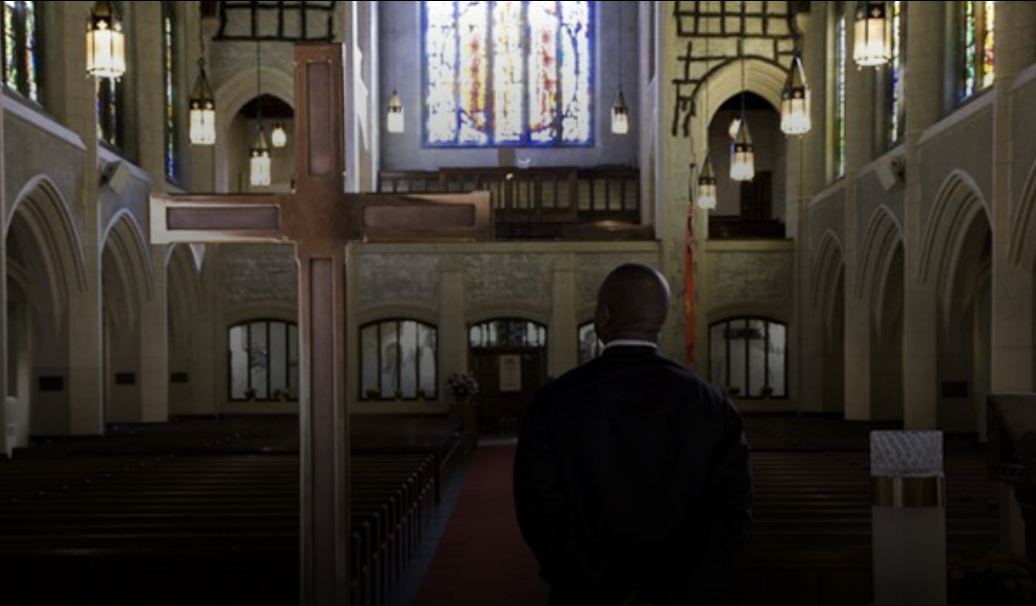
LOS ANGELES — As the pandemic wanes, the doors of most of the city’s Black churches have reopened, but many are choosing to stream the word of God rather than coming back to the sanctuary.
Church leaders, anxious to welcome believers back into the building, say about a third of members continue to depend on the digital church for a variety of reasons including health concerns, age, which makes them more vulnerable to the virus, and the sheer convenience of church on demand.
“There are those who have gotten comfortable with church at their fingertips and being able to stay home or watch on the go,” said Pastor Denon Porter of Greater Ebenezer Missionary Baptist Church in South Los Angeles.
“We want as many as who can come back to come back to in-person worship,” he added. “We are not experiencing the church life and the fellowship and brotherhood and sisterhood if each of us is at home watching on our own. That is not the definition of church.”
Church scholars say the definition of church is shifting as the Black church finds itself at a crossroads. The continuing popularity of online services — which was the only option during the height of the pandemic — is forcing church leaders to rethink the social, spiritual and cultural role of the church and how and where the word is administered.
“We were already seeing a generation move away from the church and the pandemic just accelerated that,” said the Rev. Najuma Smith-Pollard, assistant director of public and community engagement at the Center for Religion and Civic Culture at the University of Southern California. “It is not only about the impact right now, but how do we think about doing church going forward.”
The impact of the pandemic extends beyond church attendance to church finances, she said. According to Rev. Pollard, for some churches the shift away from in person services means less money in their coffers.
At the same time, other, more well-established churches — many offering the convenience of electronic payments — are growing their support.
“The Black church is resilient and will always be around, but it will be a lot smaller and less influential if it doesn’t change to meet the moment,” Rev. Pollard added. “The old church model has people coming to a building or a place and the pandemic has shown us that that place might have to shift. It might have to be more about the church going to the people, rather than the people coming to the church.”
At Crenshaw Christian Center, with some 14,000 members, church officials were taking the word to the people well before the pandemic via streaming services and a national/global TV program.
Part of the church’s mission is to make the word of God relevant to the believer and community by utilizing applicable technology, said Crenshaw Cristian Center spokeswoman, Yumiko Whitaker.
“Our online services have really become like a family.” said Whitaker. “People have gotten to know each other online and have even met up at church.
“The chat is often full of well wishes and prayers for one another. They’ve become organic micro communities.”
Rev. Jonathan Moseley, regional director of the National Action Network and former pastor of Ark of Grace Church in South L.A., says the pandemic has been a wake-up call for the church and that it must practice Christianity in the sanctuary, online and in the streets.
“We built all these fancy buildings with stained glass windows and we insulated ourselves from what was happening all around us — the crime, the homelessness, the joblessness,” Rev. Moseley said. “When the people came to the church for help, a lot of churches were not prepared to help them. They were more focused on their membership numbers, what kind of car they drove and what kind of clothes they wore.
“The church should have been the first in line to help address and solve the problems that are plaguing our people,” Rev. Moseley added.
At historic Congregational Church of Christian Fellowship in the West Adams District, longtime member Clifton Johnson says church leaders are working to invigorate their connection with the community by providing relevant services such as referring people to community resources.
“We are flinging open the doors of the church to make ourselves a resource for the community,” Johnson said.
Rev. Anthony Evans, president of the Washington, D.C.-based National Black Church Initiative (NBCI), says churches must reach out to people both in person and through technology in a manner that is meaningful to their lives.
“To win people back to the church we have to go out and get them and show that we are addressing issues that matter to them,” said Rev. Evans, who leads a coalition of 150,000 African American and Latino churches working to eradicate racial disparities in health care, technology, education, housing and the environment.
Like the Black community overall, the pandemic hit Black churches hard in terms of church-goers and church leaders. Rev. Evans of the NBCI says 25,000 pastors died of COVID-19 nationwide.
One of those church leaders was Crenshaw Christian Center pastor and founder Frederick K.C. Price, who died in early 2021 after a brief bout with COVID-19. His son, Frederick K. Price Jr., currently leads the church.
“The church has lost the rich, we have lost the poor and young married couples,” said Rev. Evans. “We have to raise our level of technology and relevance to bring them back.
“The hardest thing to do sometimes is to go out and ask people what they want,” he said. “But that is exactly what we need to do and do now.”

